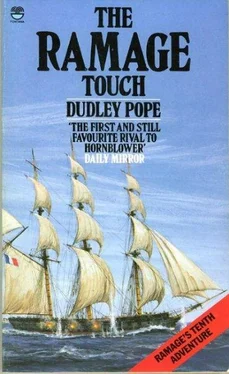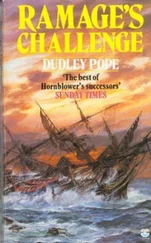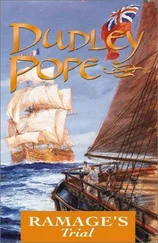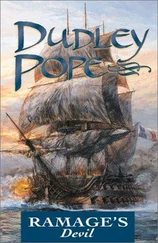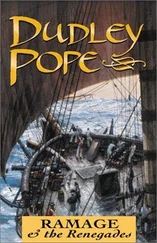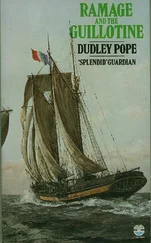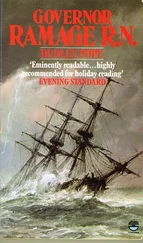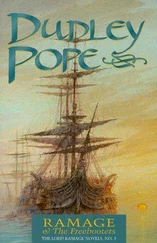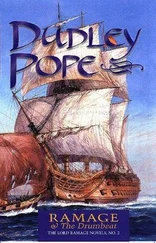Dudley Pope - The Ramage Touch
Здесь есть возможность читать онлайн «Dudley Pope - The Ramage Touch» весь текст электронной книги совершенно бесплатно (целиком полную версию без сокращений). В некоторых случаях можно слушать аудио, скачать через торрент в формате fb2 и присутствует краткое содержание. Жанр: Исторические приключения, Морские приключения, на английском языке. Описание произведения, (предисловие) а так же отзывы посетителей доступны на портале библиотеки ЛибКат.
- Название:The Ramage Touch
- Автор:
- Жанр:
- Год:неизвестен
- ISBN:нет данных
- Рейтинг книги:4 / 5. Голосов: 1
-
Избранное:Добавить в избранное
- Отзывы:
-
Ваша оценка:
- 80
- 1
- 2
- 3
- 4
- 5
The Ramage Touch: краткое содержание, описание и аннотация
Предлагаем к чтению аннотацию, описание, краткое содержание или предисловие (зависит от того, что написал сам автор книги «The Ramage Touch»). Если вы не нашли необходимую информацию о книге — напишите в комментариях, мы постараемся отыскать её.
The Ramage Touch — читать онлайн бесплатно полную книгу (весь текст) целиком
Ниже представлен текст книги, разбитый по страницам. Система сохранения места последней прочитанной страницы, позволяет с удобством читать онлайн бесплатно книгу «The Ramage Touch», без необходимости каждый раз заново искать на чём Вы остановились. Поставьте закладку, и сможете в любой момент перейти на страницу, на которой закончили чтение.
Интервал:
Закладка:
"Lord Ramage?" he asked, seeming breathless, his hands grasping the arms of the chair as though he expected to be tipped out of it at any moment.
"Yes - why? Is my reputation so bad?"
Admiral Poitier shook his head. "Not bad in that sense . . ."
"What sense?" Ramage asked, curious but at the same time flattered that the French in Toulon had even heard of him, let alone given him an assessment.
"Well, talk from the West Indies . . . that you abandoned drowning men after sinking their ships - that sort of thing."
Ramage thought back over several years in the Caribbean; he remembered the trouble and risks he had taken to rescue the survivors - scores, indeed hundreds of them - in the action in which he had captured the Calypso. Risks, because the rescued were so numerous they could have seized the ship from the rescuers, and that had led to a warning from his own admiral. In crossing the Atlantic the story had undergone a radical change ...
He looked directly at Admiral Poitier. "Do you believe such stories now?"
Poitier shook his head vigorously. "I do not believe them now and I did not really believe them then. You understand that newspapers like Le Moniteur have to print stories of British atrocities." He gave a short, dry laugh. "Now I think about it, I should really have been able to say: 'Yes, Captain Lord Ramage?' when you came down to me in the cabin and addressed me as 'Admiral Poitier'. The attack on Porto Ercole, the sinking of one of my frigates using one of my own bomb ketches . . . yes, it has the Ramage touch."
"You flatter me," Ramage said, thinking that Admiral Poitier's compliment meant a good deal more than the grudging treatment he had recently received from the commander-in-chief on the Jamaica Station. "However . . ." he said, his tone changing to indicate that the conversation was now taking a different turn, "I believe you were engaged upon 'a special service', with your frigates and the bomb ketches."
"Of course not," Poitier said slowly, as if considering each word. "Just a routine cruise."
"With bomb ketches?"
"I met them by chance."
"But three frigates and two bomb ketches - an unusual squadron to be cruising in the Mediterranean, you must admit. What targets are there for bomb ketches? With few ships of my own country - this one is almost an exception - in the Mediterranean, is not a squadron of three frigates rather large?"
Poitier could not see that the documents on the desk came from his own cabin in the Furet, Ramage realized. Most British naval officers would know that such grey-tinted paper would not be used by the Admiralty or commanders-in-chief, but, after years of war, a Frenchman would have forgotten that really white paper still existed.
"Admiral," Ramage began, tapping the small pile of documents, "I have been -"
He had heard someone clattering down the companionway and now the sentry knocking on the door interrupted him. "Captain, sir: Mr Aitken would like to see you."
"Send him in."
Aitken had a broad grin on his face and Ramage realized that the Scot was a handsome fellow, a fact which was usually disguised by his sombre expression.
Noting Poitier's presence, the first lieutenant said: "May I report to you privately, sir?"
Damn! Ramage had spent some time leading up to the right moment - creating it, in fact - when he would confront Poitier and force the secret of the expedition out of him. Now Aitken had arrived at the wrong moment. Yet Aitken would not have intruded unless. . . Ramage picked up his hat and followed the Scotsman from the cabin, telling the sentry to latch back the door and keep an eye on the prisoner.
Halfway up the companionway Ramage hissed up at Aitken: "What's happened?"
"That xebec, sir: Wagstaffe's sent it. Orsini's brought news of what happened at Porto Ercole."
Ramage stopped climbing. "What happened that we don't know about?"
"Well, nothing really important, sir," Aitken said lamely. "I just thought -"
"Very well, tell Orsini to wait: I want half an hour with this French officer ..."
Aitken acknowledged the order and Ramage went down the companionway, apologized to a startled Poitier for the interruption, and sat down at his desk after dropping his hat on the settee once again.
"We were discussing your orders," he reminded Poitier, "and you claimed you were on a routine cruise."
"Yes," Poitier said, obviously becoming bored, as well as tired and shaky from his leg wound. "A routine cruise. We'd sighted nothing; we needed wood and water . . ."
"Why choose Porto Ercole and not a large port like Leghorn?"
"Light winds," Poitier said smoothly. "It would have taken days -"
"But you arrived off Argentario from the direction of Leghorn," Ramage interrupted. "I saw you."
"That is true," Poitier admitted. "I like Porto Ercole. The wine, plenty of wild boar from the Maremma, as much fresh water and wood as we need . . ." The Frenchman's voice had a confidential note, as though he was confessing to Ramage that he had a weakness for roast boar.
Ramage nodded understandingly but then the Frenchman saw his eyes narrow, the skin over his cheeks and nose tautening, and his left hand slap down three or four times on some papers, the heavy signet ring on the little finger banging on the desk top. "Admiral, you were engaged in some secret operation. I want to know what it was."
Poitier held out his hands, palms upwards. "Yes, I admit it, of course. The bomb ketches give that away. The details I do not know: they were secret, you understand - probably only the Minister of Marine and a few others would know the details. Nothing was in writing - except for assembling some of the ships. Only the senior army commanders and the admirals received verbal orders about the destination. You do the same in England."
Ramage did not bother to contradict him; there was no point in telling him that the details of most secret operations were usually the talk of fashionable London drawing rooms for days and weeks beforehand. The idea of a secret operation being mounted from Britain was almost ludicrous, unless only one or two ships were involved.
"Nevertheless, because your role in this operation is now over, Admiral, I should be interested to know what it was."
Poitier eased his wounded leg and nodded. "Yes, I suppose there can be no harm in telling you: the seamen in all three frigates knew - the regular ship gossip, of course. We were to embark cavalry, infantry and artillery at Porto Ercole and carry them elsewhere. We were doing that when my - when your," he corrected himself, "bomb ketches attacked."
"Where were you to transport them?"
Poitier shrugged his shoulders most convincingly. "I do not know: I was expecting a messenger hourly from the Minister in Paris with further orders. He had not arrived when you attacked."
Ramage saw that the Frenchman had been quick with his story and it was convincing enough for Poitier to be able to keep to it. The messenger from Paris . . . delayed as the frigates prepared to sail... so likely, so readily understood by an enemy officer. Poitier might be feeling weary and his leg might hurt, but he was thinking quickly and clearly. Very well, the pressure must be applied; another turn taken up on the rack.
Ramage said quickly but firmly, his fingers tapping on the papers as though it was a nervous habit: "I must know your ultimate destination, Admiral. It affects the safety of my country and the lives of my countrymen."
"I am sorry I cannot help you, Lord Ramage," Poitier said regretfully. "I am a prisoner and no further use to my own country, but I was told so little."
The Frenchman had changed in the last few minutes - from the time that Aitken had come in. His complexion was less grey, his face less lined, and he was sitting upright in the chair now, as though this was his cabin and Ramage merely a tiresome visitor. Ramage felt instinctively that the longer he kept the admiral sitting there in the armchair the less chance he had of wringing any secrets out of him. The Frenchman's confidence had imperceptibly returned. Now was the time for gentle threats - and perhaps some that were not so gentle.
Читать дальшеИнтервал:
Закладка:
Похожие книги на «The Ramage Touch»
Представляем Вашему вниманию похожие книги на «The Ramage Touch» списком для выбора. Мы отобрали схожую по названию и смыслу литературу в надежде предоставить читателям больше вариантов отыскать новые, интересные, ещё непрочитанные произведения.
Обсуждение, отзывы о книге «The Ramage Touch» и просто собственные мнения читателей. Оставьте ваши комментарии, напишите, что Вы думаете о произведении, его смысле или главных героях. Укажите что конкретно понравилось, а что нет, и почему Вы так считаете.
